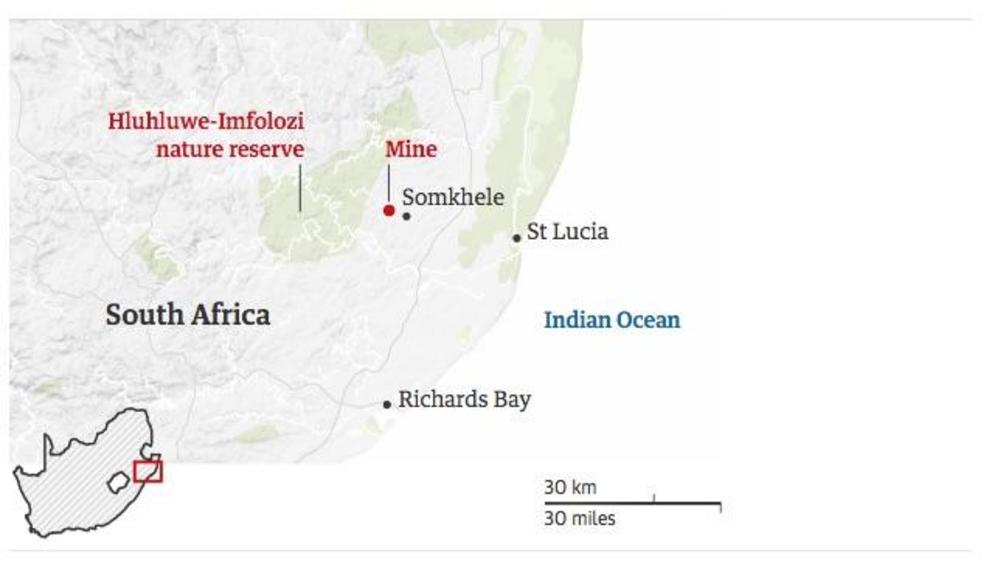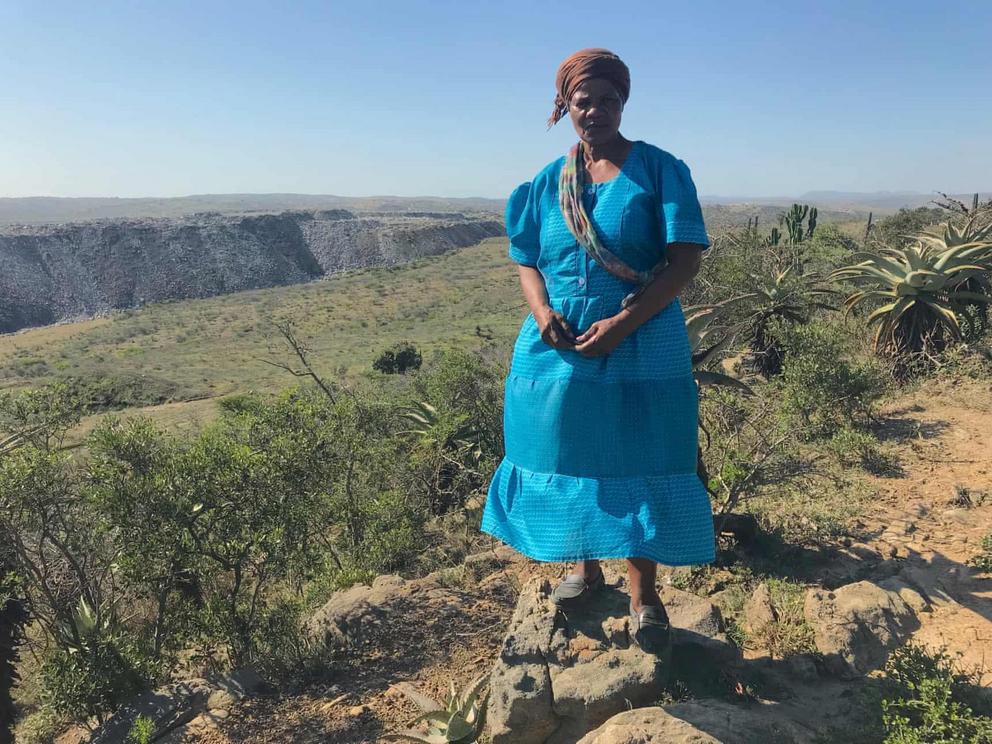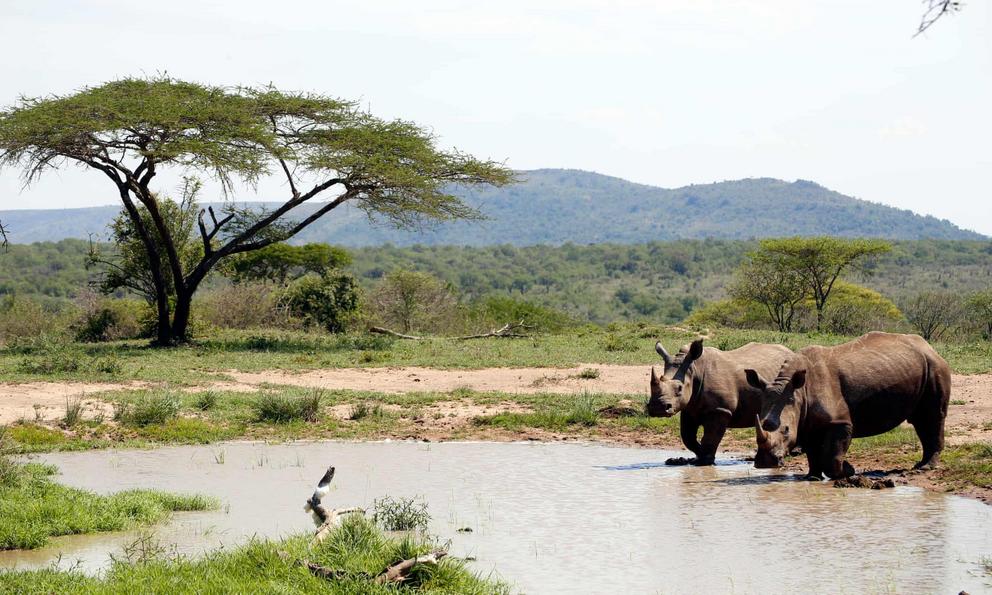Open coalmine near Africa's first nature reserve divides community
Poverty, conservation and industry are at loggerheads in the eastern town of Somkhelet
Drive for an hour into the hills that lie behind South Africa’s wild eastern coast, and you will find a game park full of rhino and big cats, a sprawling town spread over dozens of summits and dry valleys, and a vast opencast coal mine.
If all the advantages of the rainbow nation – stunning landscape and wildlife, massive mineral resources and a youthful population – are represented here, then so too are all its problems.
Somkhele is home to tens of thousands of people living in rudimentary houses on parched patches of land, many of whom would be entirely destitute without monthly welfare payments of less than £20.
Within a 15-minute drive, there is Hluhluwe–Imfolozi, the oldest nature reserve in Africa, where hundreds of rhinos, antelope and big cats graze under the wondering gaze of tourists. In between lie the rubble and workings of the opencast mine.
The tensions between the three are now reaching a critical point. The mining company wants to dig out more coal, and has been granted rights for a vast new swath of land. Activists in Somkhele have gone to court to shut the mine, or at least stop any expansion, which mining officials say would have the same result. A judgment is due within weeks and will set a precedent that could have far-reaching consequences.
- "Mining shouldn’t be seen as the solution to all problems. The government needs to be more creative"
“If the judge finds against us, he is saying mining companies in South Africa don’t have to comply with the law, and that is terrifying. If he finds for us, he says the law in this country is to be respected by everybody,” said Kirsten Youens, a lawyer acting for community groups in Somkhele.
Jan du Preez, CEO of Petmin, the company which owns the Somkhele mine, said its operations were fully compliant with all legal requirements, and accused critics of being activists who hate mining.
“It would be wonderful if the world could obtain its raw materials with zero harm, but that is in utopia,” Du Preez told the Guardian.

“While the world needs environmental activists to protect against unscrupulous people, these activists also need to … actually consider the facts. Unfortunately some are idealists who would rather have a devastated economy and no jobs than a responsibly run mine. ”
Across South Africa, and across the continent, there are similar confrontations as officials come under pressure to ensure economic growth – even at the cost of the environment.
Thulziwe Jane Dladla, who lives in a traditional cluster of small houses and huts overlooking the Somkhele mine, listed her grievances: dust, noise and ground-shaking blasting, heavy truck traffic, inadequate compensation for households relocated and a lack of communication since mining began a little over a decade ago.
“Life here is too bad,” she said.
Officials at the mine, which produces rare and valuable anthracite coal used in the metal industry, say none of these complaints is justified and point out benefits to the community including more than a thousand jobs, a maternity ward for the local clinic, roads, water pipes, a school, a creche and training programmes.
Du Preez said fair compensation was paid to displaced families, with the costs of moving graves of ancestors also covered by the company.
The community’s traditional leaders, elected municipal officials and the mining union’s local branches almost unanimously back the mine. So too, it appears, does the government. Last month, Gwede Mantashe, minister for mineral resources, travelled to Somkhele and the site of another controversial mine, Xolobeni, where an Australian company has been trying to mine titanium, to rally support.
The African National Congress, in power since South Africa’s first free elections in 1994, believe such developments will give a much-needed boost to the country’s flagging economy.
But Mantashe’s trip was not a success. In Somkhele, he angered some locals by leaving them waiting for several hours before a brief meeting. In Xolobeni, his visit ended in disorder, with teargas fired by police to disperse demonstrators and a well-known environmental lawyer arrested.
“The minister was disrespectful,” said Bongani Pearce, one of the Somkhele activists. “The government isn’t on our side.”
- "They are all on the side of the mines. They don’t care about small people like us"
Dladla, 56, admitted the community was split, with some welcoming the opportunities the mine has brought in an area where jobs are rare, especially for young people. It is these divisions that pain her most.
“We were a community gathering together. But the coming of the mine separated us,” she said.
Activists claim that Cyril Ramaphosa, South Africa’s president since February, is biased. The liberation struggle leader turned multimillionaire businessman made a fortune in mining before returning to politics.
“They are all on the side of the mines. They don’t care about small people like us,” said Dladla.
ANC officials dismiss the charge as ridiculous. They argue that South Africa is still desperately poor and cannot afford to ignore the earning potential of its resources. If mining has shrunk as a proportion of GDP, the industry has long been central to the party’s plans to empower and enrich the country’s majority communities.

Somkhele resident Thulziwe Jane Dladla, with the Petmin opencast coal mine in the background. Photograph: Jason Burke for the Guardian
Melissa Fourie, executive director of the Centre for Environmental Rights, said the approach was short-term.
“Mining shouldn’t be seen as the solution to all problems. The government needs to be more creative in its thinking. We don’t have to destroy precious natural resources for ever,” she added.
But the ANC is under pressure. Elections are due next year, and calls for rapid and radical economic transformation from populists like Julius Malema and his Economic Freedom Fighters party resonate with the millions who feel that the prosperity and equality promised when the racist apartheid regime crumbled are unfulfilled.
“I don’t like the EFF’s strategy and all the confrontation, but I hear what they are saying and it makes sense,” said Dladla’s 25-year-old son, who has moved to the city of Durban, 140 miles (225km) away, to find work.
With massive debts and limited revenue opportunities, ruling party officials are also desperate for foreign investment.
One potential source is China, which recently promised investment of more than $1.1bn (£830m) in industrial infrastructure and plants, including a big coal mine in the north-east and a 4600MW coal-fired power station.
Experts say renewable energy sources now offer a cheaper way to supply South Africa’s power needs, and would avoid extensive environmental damage.
Some Somkhele inhabitants fear the coming judgement may exacerbate existing divisions.
“If we lose, the whole community will be torn apart. There will not be peace. There will be disorder,” said Duduzile Mkhwanazi, 36, a local farmer and mother of three.
“But it is important. It is a start for us, a beginning. I don’t want my kids to grow up without jobs or schooling, but I don’t want them to grow up next to a mine either.”

